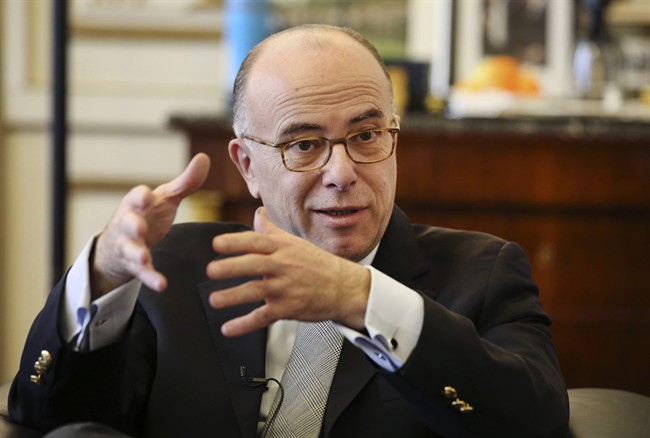PARIS – France is tracking hundreds of people believed to belong to possible sleeper cells for terror organizations like al-Qaida or the Islamic State group, the country’s top security official said.

In an interview with The Associated Press, Interior Minister Bernard Cazeneuve laid out what has become an increasingly urgent question for European intelligence services: How to trace the moment when someone transforms from a disgruntled criminal or a disaffected citizen into a terrorist, and how to block those first steps toward radicalization.
“Four hundred targets have been identified by our intelligence services that are more or less sleeper cells, affiliated or in relation with al-Qaida-type organizations, that can strike like the Kouachi brothers,” Cazeneuve said in an interview late Monday ahead of his Wednesday departure.
READ MORE: 4 men to be charged in connection to Paris attacks
Said and Cherif Kouachi were French-born brothers who killed 12 people in Paris on Jan. 7 when they stormed the satirical newspaper Charlie Hebdo. They were shot dead by police in a confrontation two days later.
Cazeneuve said he wants new measures to give intelligence services more leeway to monitor suspects’ electronic communications. He is heading to the United States this week to try and persuade Internet giants to step up and help stem extremists’ ability to use propaganda videos to recruit and indoctrinate new followers.
Facebook, Twitter, Apple and Google – all major vectors for increasingly sophisticated jihadi clips targeting potential followers in the West – will be among his stops in Silicon Valley.
“Ninety per cent of those who commit terrorist acts fall into it after regularly consulting websites or blogs that call for or provoke terrorism,” Cazeneuve said.
READ MORE: To counter terror, Europe’s police reconsider their weapons
With the news that the gunman in the deadly Copenhagen attacks this weekend may have been radicalized during one of a series of stints in jail – like at least two of the gunmen in the Paris attacks last month – Cazeneuve’s trip to the United States to strengthen intelligence sharing between governments and win over the tech firms takes on added importance.
The minister said the Kouachi brothers were under French surveillance from 2011 until 2014 after the U.S. government tipped off the French about their possible trip to Yemen, but the monitoring produced nothing that indicated they were on the verge of a deadly attack.
Cherif Kouachi had served time for being part of a jihadi recruiting network and was apparently behind bars when he met the third Paris gunman, Amedy Coulibaly, a small-time criminal who became radicalized in prison. Coulibaly pledged allegiance to the Islamic State group in a posthumously released video that is still circulating among jihadis.
READ MORE: Europe on edge as terror crackdown widens
“When you have terrorists who keep a low profile for years and then suddenly decide to act – either to obey an order from large terrorist organization such as al-Qaida or of their own volition – then you need to be able to monitor them on a long term,” the minister said.
France also is pushing to treat jihadi material on the Internet like child porn, a task that before the attacks in Paris was getting scant traction but now seems to have caught the attention of Europe’s top security officials.
“Everyone agrees now that legislation that prevents the diffusion of child pornography is protecting citizens from crime. It is the same for terrorism,” Cazeneuve said. “Calling for anti-Semitism, calling for crimes, calling for murder, calling for the killing of Jews or journalists – that’s not about freedom of expression. That is a criminal act.”



Comments